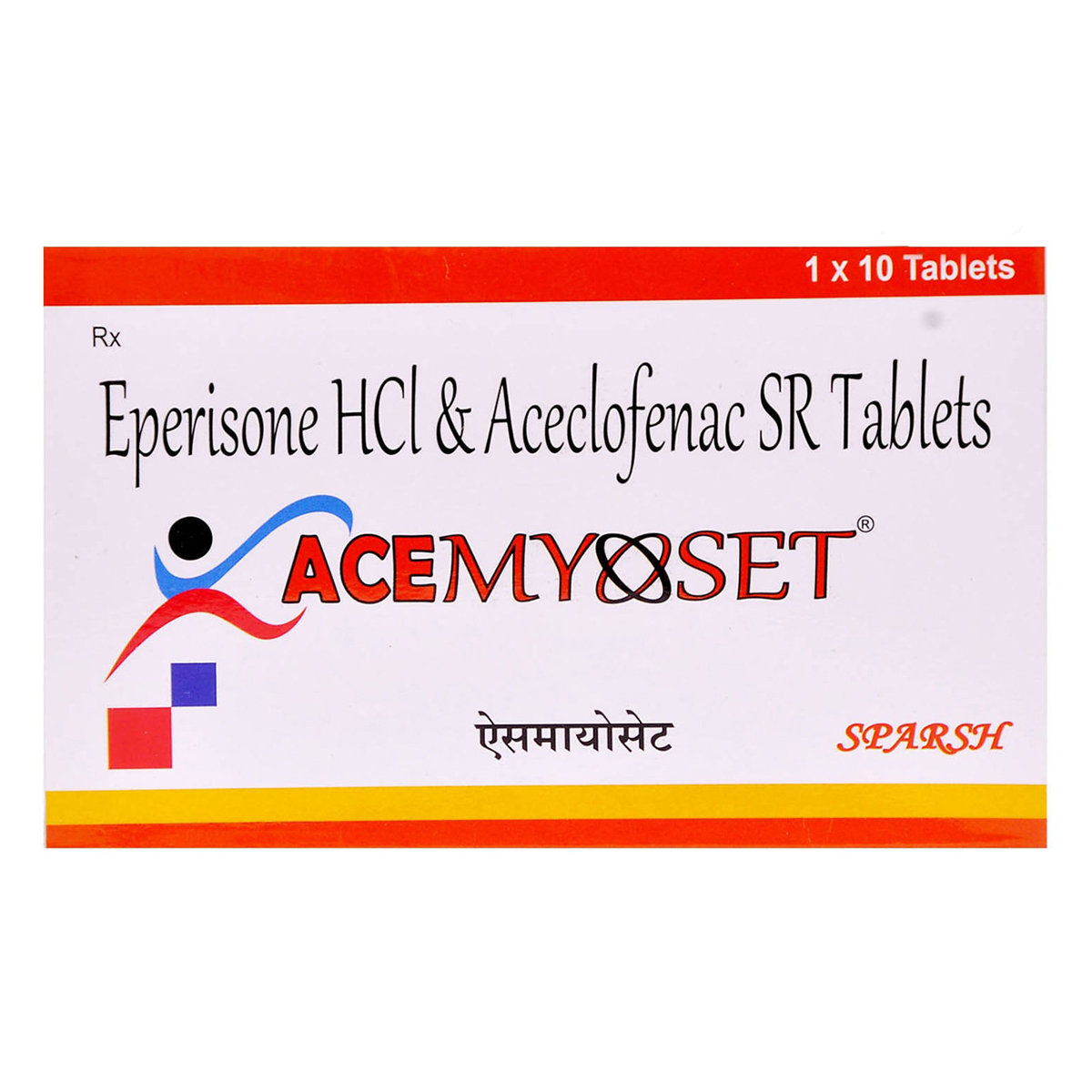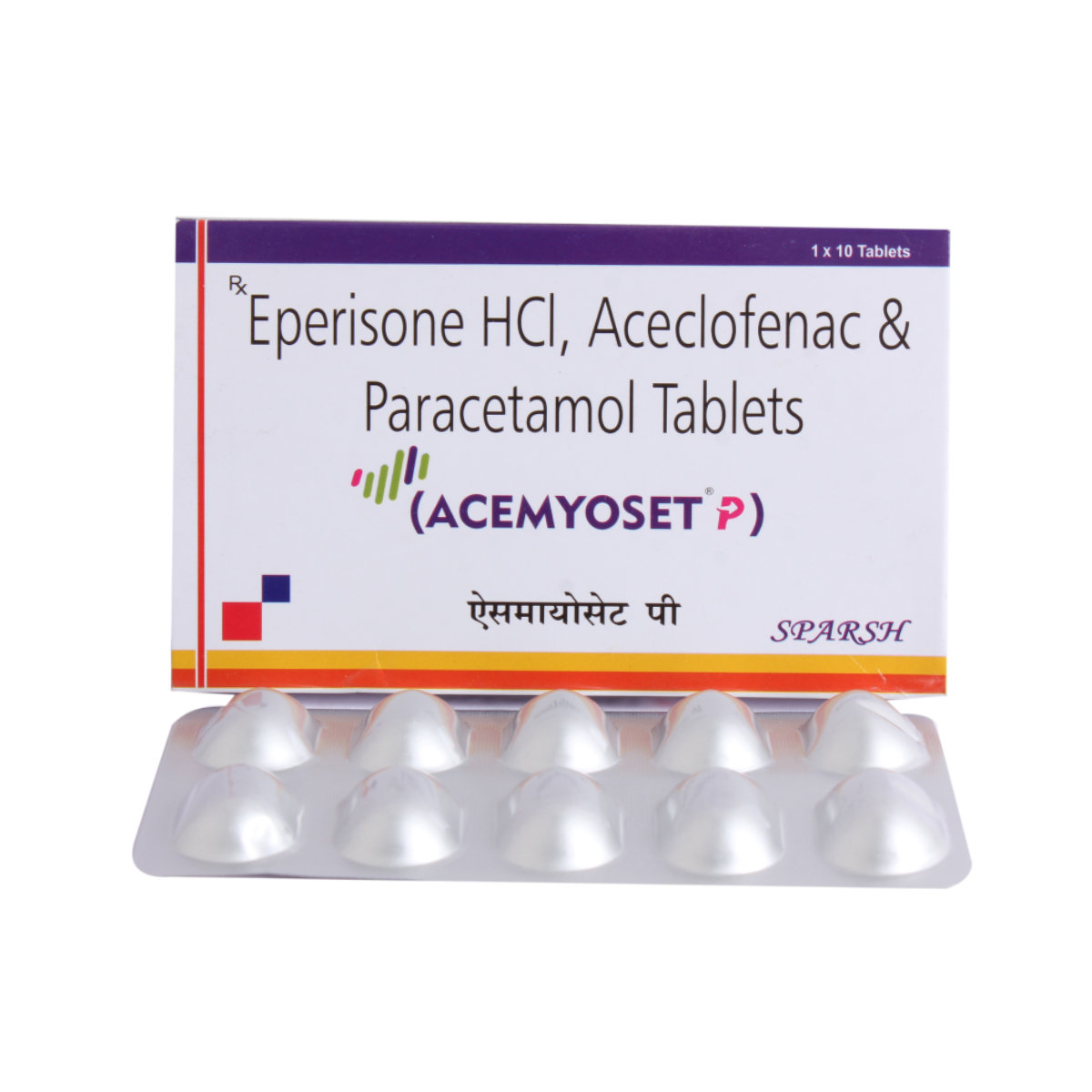Aceclofenac+eperisone
About Aceclofenac+eperisone
Aceclofenac+eperisone is a combination medicine used to treat pain associated with muscle spasms that usually occur due to muscle strains, sprains, or injuries in the lower back. It reduces muscle stiffness and enables easy movement of the muscle. The common causes of muscle spasms are lack of regular exercise, improper postural lifting, inadequate or poor posture, and fractures.
Aceclofenac+eperisone contains Eperisone and Aceclofenac. Eperisone is an antispasmodic. It works by relaxing skeletal muscles and reducing myotonia (inability of muscles to relax). It relaxes vascular smooth muscles (present in the blood vessel wall) and improves blood circulation. Aceclofenac is a nonsteroidal anti-inflammatory drug (NSAID). It works by reducing prostaglandins' production (chemical substances that cause pain and inflammation) at the affected site (muscle) and easing pain.
Take Aceclofenac+eperisone exactly as prescribed by your doctor. Aceclofenac+eperisone may cause certain common side effects such as nausea, vomiting, stomach pain, heartburn, diarrhoea, indigestion, flatulence (gas), lack of appetite, headache, weakness, drowsiness, disorientation, and skin rash or patches. Most of these adverse effects are minimal and only last a short time. Contact your doctor right away if any of these side effects persist or worsen.
Before taking Aceclofenac+eperisone, notify your doctor if you have stomach bleeding or ulcers, a history of stomach or intestinal troubles with NSAIDs, severe liver, kidney, or heart failure, a history of heart attack or stroke, or problems with blood circulation. Pregnant women and nursing mothers should consult a doctor before taking Aceclofenac+eperisone. It should be used with caution in older individuals. Alcohol should be avoided at all costs because it increases the risk of harmful consequences. Do not drive or operate heavy machinery if you are not fully attentive, as Aceclofenac+eperisone may cause dizziness or drowsiness.
Uses of Aceclofenac+eperisone
Medicinal Benefits
Aceclofenac+eperisone is used to treat pain associated with muscle spasms that usually occur due to muscle strains, sprains, or injuries in the lower back. It contains eperisone and aceclofenac. Eperisone is a muscle relaxant that shows an analgesic effect (relieve pain), whereas aceclofenac can reduce pain, swelling, and inflammation in the muscles. It reduces muscle stiffness and enables the easy movement of the muscle. For the best results, rest and physical therapy are also essential along with Aceclofenac+eperisone.
Directions for Use
- Aceclofenac+eperisone can be taken with meals to prevent stomach upset.
- It is usually taken 1-2 times daily or as prescribed by your doctor.
- Swallow Aceclofenac+eperisone as a whole with a glass of water.
- Do not break, chew, or crush it.
Storage
Side Effects of Aceclofenac+eperisone
- Dizziness
- Nausea (feeling sick)
- Diarrhoea
- Increased liver enzymes in the blood
- Sleepiness
- Nausea/vomiting
- Anorexia
- Stomach discomfort
- Abdominal pain
Drug Warnings
If you have any bowel disorders, such as colitis (intestinal inflammation), kidney or liver problems, porphyria (inherited blood disorder), bleeding disorders, asthma, seasonal allergies, long-term respiratory infections or illnesses, angina (chest pain), blood clots, high blood pressure, high cholesterol, diabetes, systemic lupus erythematosus (a skin disorder), smoking habit, or intolerance to certain sugars, tell your doctor before taking Aceclofenac+eperisone. When used in large doses over long periods, Aceclofenac+eperisone raises the risk of heart attack or stroke. Therefore, follow the doctor's instructions for dosage and duration. Call your doctor right away if you experience chest pain, difficulty breathing, weakness, or slurred speech. These symptoms could indicate heart or blood vessel problems.
Drug Interactions
Drug-Drug Interactions: Aceclofenac+eperisone may interact with other painkiller NSAID drugs (e.g. aspirin, ibuprofen, celecoxib, etoricoxib), anti-depressants (e.g. citalopram, escitalopram, fluoxetine), medicines used to treat heart failure and irregular heartbeats (e.g. digoxin), antihypertensives (e.g. enalapril, losartan, propranolol), antibiotics (e.g. ciprofloxacin, levofloxacin), diuretics (e.g. thiazides, furosemide hydrochloride), anticoagulants (e.g. warfarin, heparin), steroids (e.g. hydrocortisone, prednisolone), HIV medications (e.g. zidovudine), antidiabetics (e.g. glibenclamide, gliclazide).
Drug-Food Interactions: Alcohol consumption should be avoided because it can cause dizziness and gastrointestinal bleeding.
Drug-Disease Interactions: Aceclofenac+eperisone should be avoided in individuals with stomach bleeding or ulcers, NSAID-related stomach or bowel problems, severe liver, kidney, or heart failure, a history of heart attack or stroke, or problems with blood circulation.
Drug-Drug Interactions Checker List:
Safety Advice

Alcohol
cautionConsumption of alcohol increases the risk of side effects, such as liver damage and bleeding in the stomach.

Pregnancy
unsafeAceclofenac+eperisone is usually not recommended during pregnancy, especially if you are more than six months pregnant, as it may cause harmful effects to the unborn baby.

Breast Feeding
unsafeAceclofenac+eperisone may pass into breastmilk and cause unwanted effects in the nursing baby. So, it is not prescribed in breastfeeding mothers. However, if prescribed, the doctor may advise you to stop breastfeeding while using this medicine.

Driving
cautionAceclofenac+eperisone may cause dizziness or drowsiness, so do not drive or operate heavy machinery if you are not fully alert.

Liver
cautionAceclofenac+eperisone should use with caution in patients with liver diseases. The dose may have to be adjusted by your doctor.

Kidney
cautionAceclofenac+eperisone should be used with caution in patients with kidney diseases. The dose may have to be adjusted by your doctor.

Children
unsafeAceclofenac+eperisone is not recommended for children below 12 years of age.
Habit Forming
Diet & Lifestyle Advise
- Regular exercise helps to stretch muscles, making them less likely to spasm, tear, or sprain. Muscle stretching can be accomplished with light workouts such as running and walking.
- Deep tissue massages with a muscle massager are thought to be beneficial.
- Wear loose-fitting clothing instead of tight-fitting clothing.
- Get plenty of rest and sleep (at least 8 hours for adults).
- Muscle spasms can be treated with either hot or cold therapy.
- For 15-20 minutes, apply an ice pack or a heat pack to the muscle.
- Glycine (protein) is a wonderful food for your muscles; therefore, try to include it in your daily diet.
Special Advise
- If Aceclofenac+eperisone is prescribed for longer durations, your doctor may propose that you have regular blood tests to check your liver function.
- To decrease stomach and intestine side effects like diarrhoea and upset stomach, take Aceclofenac+eperisone with food.
Patients Concern
Disease/Condition Glossary
Pain due to muscle spasms: It is a common condition that occurs due to injury, sprain, or strain to the muscles, bones, or ligaments present in the lower portion of the spine. The common causes are lack of regular exercise, improper postural lifting, inadequate or poor posture, and fracture. Pain in the lower back is the only symptom often seen with this condition. Analgesics (pain relievers) and physical therapy can help to relieve pain. Exercise helps in muscle stretching so that they are less likely to spasm, tear and sprain.
FAQs
Aceclofenac+eperisone is a combination medicine used to treat pain associated with muscle spasms that usually occur due to muscle strains, sprains, or injuries in the lower back.
Aceclofenac+eperisone contains Eperisone and Aceclofenac. Eperisone is an antispasmodic. It reduces muscle stiffness by relaxing the muscles and reducing pain by improving blood circulation and suppressing pain reflexes. Aceclofenac is a nonsteroidal anti-inflammatory drug (NSAID). It works by reducing prostaglandins' production (chemical substances that cause pain and inflammation) at the affected site and reducing pain and swelling. Together, Aceclofenac+eperisone can effectively treat pain due to muscle spasms.
The common side-effects of Aceclofenac+eperisone are dizziness, nausea (feeling sick), diarrhoea, increased liver enzymes in the blood, sleepiness, insomnia, headache and numbness in the extremities, and rash. These side-effects are usually mild and temporary. However, if any of these side effects persist or get worse, inform your doctor immediately.
Let your doctor know that you are taking Aceclofenac+eperisone before undergoing surgery of the stomach or intestine as Aceclofenac+eperisone can delay wound healing in some cases.
Aceclofenac+eperisone is probably safe and well-tolerated in diabetic patients when taken at recommended doses. However, higher doses or prolonged use may affect sugar levels and cause unwanted effects. So, let your doctor know that you have diabetes before taking Aceclofenac+eperisone.
It is recommended to take Aceclofenac+eperisone with food or after a meal to minimize side effects such as upset stomach or diarrhoea.
Aceclofenac+eperisone is safe if used in the dose and duration recommended by your doctor. Take it precisely as directed, and do not skip any dose. Follow your doctor's guidelines carefully and inform your doctor if any of the side effects disturb you.





